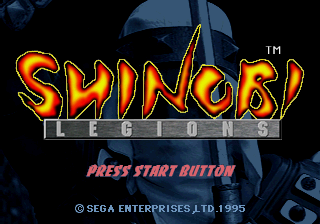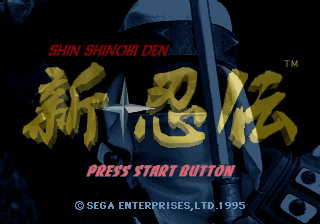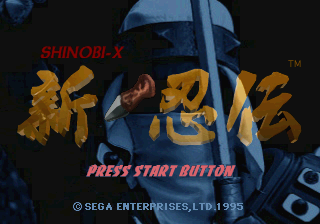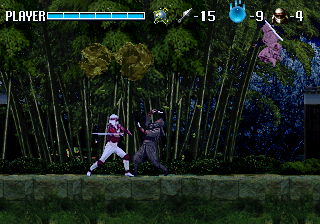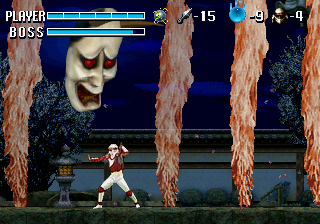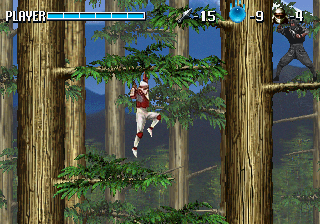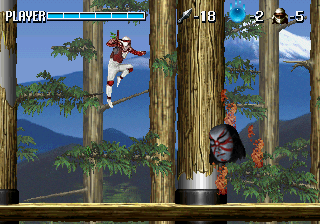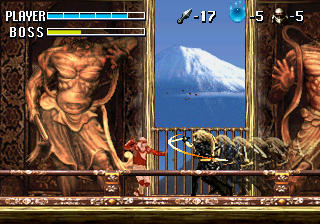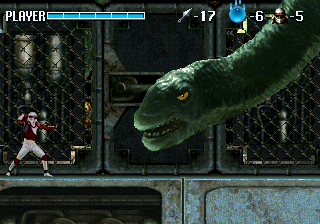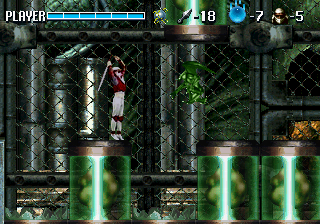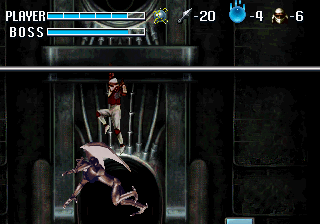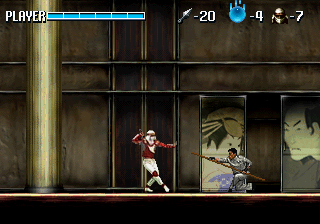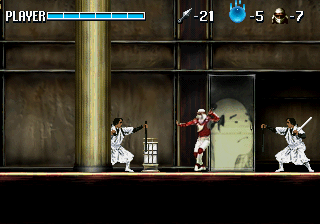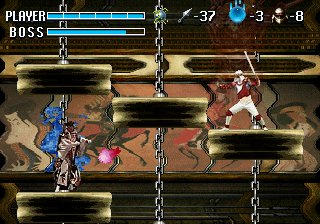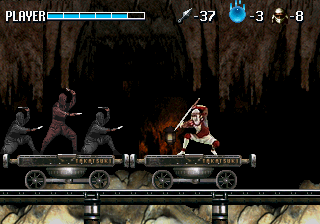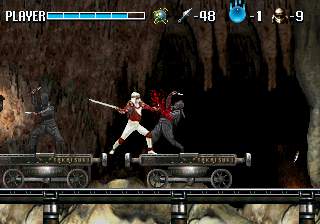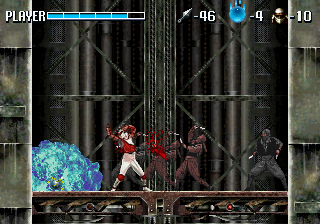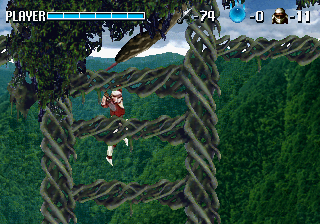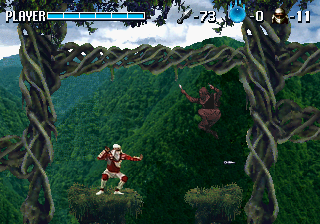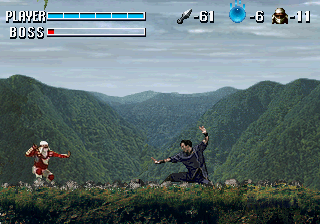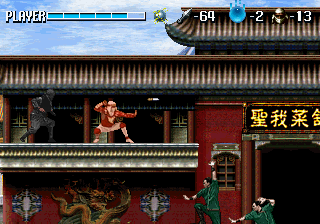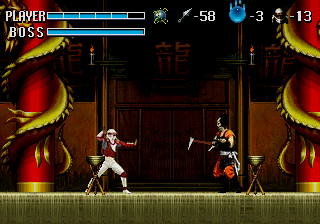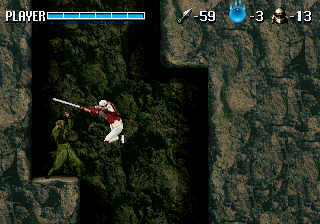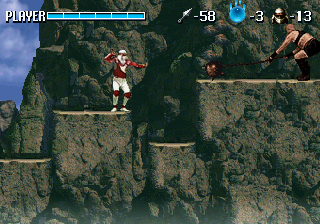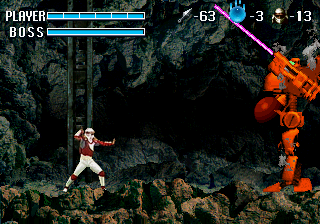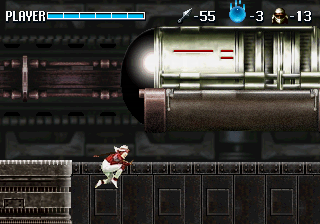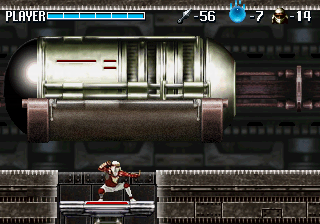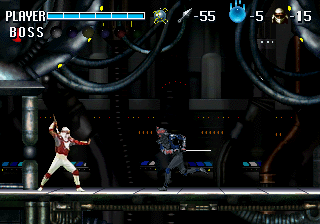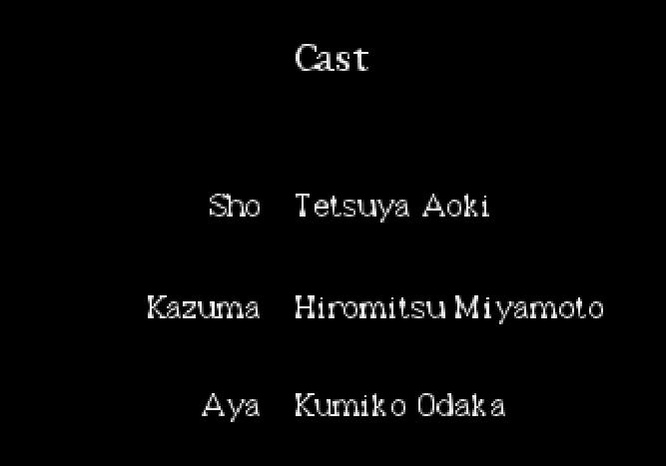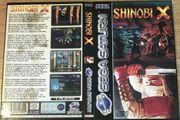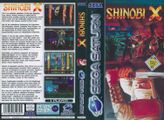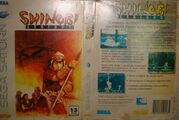Difference between revisions of "Shinobi Legions"
From Sega Retro
| (55 intermediate revisions by 9 users not shown) | |||
| Line 1: | Line 1: | ||
{{Bob | {{Bob | ||
| bobscreen=ShinobiLegions title.png | | bobscreen=ShinobiLegions title.png | ||
| − | | publisher=[[Sega]], [[ | + | | bobscreen2=ShinobiLegions Saturn JP SSTitle.png |
| + | | bobscreen3=ShinobiLegions Saturn EU SSTitle.png | ||
| + | | tab1=NTSC-U | ||
| + | | tab2=NTSC-J | ||
| + | | tab3=PAL | ||
| + | | publisher={{company|[[Sega]]|region=Japan, Europe}}, {{company|[[VIC Tokai]]|region=US}} | ||
| developer=[[Sega]], [[Tose]] | | developer=[[Sega]], [[Tose]] | ||
| system=[[Sega Saturn]] | | system=[[Sega Saturn]] | ||
| − | |||
| sounddriver=SCSP/CD-DA (2 tracks) | | sounddriver=SCSP/CD-DA (2 tracks) | ||
| peripherals= | | peripherals= | ||
| players=1 | | players=1 | ||
| − | | genre=Action | + | | genre=Action{{fileref|Shinshinobiden sat jp backcover.png}}{{ref|https://web.archive.org/web/20200330225358/https://sega.jp/history/hard/segasaturn/software.html}} |
| releases={{releasesSat | | releases={{releasesSat | ||
| − | | sat_date_us=1995-09{{ | + | | sat_date_jp=1995-06-30{{ref|https://web.archive.org/web/20200330225358/https://sega.jp/history/hard/segasaturn/software.html}} |
| + | | sat_code_jp=GS-9010 | ||
| + | | sat_rrp_jp=4,800 | ||
| + | | sat_rating_jp=18 | ||
| + | | sat_date_us=1995-09-21{{magref|gamepro|75|50}}{{ref|https://groups.google.com/g/rec.games.video.sega/c/rfT1IqWTXMY/m/QhoRO3AkhqAJ}} | ||
| sat_code_us=T-2301H | | sat_code_us=T-2301H | ||
| + | | sat_rating_us=t | ||
| sat_date_eu=1995 | | sat_date_eu=1995 | ||
| − | |||
| sat_code_eu=MK81082-50 | | sat_code_eu=MK81082-50 | ||
| − | | sat_rrp_uk=49.99{{ | + | | sat_rating_eu=11 |
| − | | | + | | sat_date_uk=1995-10-13{{magref|ctw|558|20}}<!--1995-10-06{{magref|segamaguk|22|60}}{{ref|https://groups.google.com/g/rec.games.video.sega/c/JzHO19siSFc/m/WDh31PaANxkJ}}--> |
| − | | | + | | sat_code_uk=MK81082-50 |
| − | | | + | | sat_rating_uk=11 |
| + | | sat_rrp_uk=49.99{{magref|ssm|1|96}} | ||
| + | | sat_date_de=1995 | ||
| + | | sat_code_de=MK81082-50 | ||
| + | | sat_rating_de=16 | ||
| sat_date_br=199x | | sat_date_br=199x | ||
| sat_code_br=192136 | | sat_code_br=192136 | ||
| + | | sat_rating_br=13 | ||
| + | | sat_date_pl=1996 | ||
| + | | sat_rrp_pl=199 | ||
| + | | sat_date_au=199x | ||
| + | | sat_code_au=FSHI06SSC | ||
| + | | sat_rating_au=m15 | ||
| + | | sat_date_pt=199x | ||
}} | }} | ||
| − | | | + | | properties={{Properties|SAT|ssl}} |
| − | | | ||
| − | |||
| − | |||
| − | | | ||
}} | }} | ||
'''''{{PAGENAME}}''''', known as '''''Shinobi X''''' in Europe and '''''Shin Shinobi Den''''' (新・忍伝) in Japan, is a video game in the ''Shinobi'' series, originally released for the [[Sega Saturn]] in 1995. During development the game was known as '''''Shinobi EX'''''. | '''''{{PAGENAME}}''''', known as '''''Shinobi X''''' in Europe and '''''Shin Shinobi Den''''' (新・忍伝) in Japan, is a video game in the ''Shinobi'' series, originally released for the [[Sega Saturn]] in 1995. During development the game was known as '''''Shinobi EX'''''. | ||
| + | |||
| + | The game uses digitized graphics for its character sprites and makes heavy use of live-action cutscenes, which have been criticised for the quality of their costumes and acting. | ||
| + | |||
| + | Programming errors mean that ''Shinobi Legions'' cannot be played if two controllers are connected to the console. | ||
| + | |||
| + | ==Story== | ||
| + | Years of civil war have brought the ninjutsu code and its warriors to the brink of extinction. A ninjutsu master selects three children to carry on the ninja traditions for the next generation: two brothers, Kazuma and Sho, and his own daughter Aya. He begins to train them. | ||
| + | |||
| + | Fifteen years pass. The oldest boy, Kazuma, begins to reject all the ninjutsu teachings, save for the technique of strength. Obsessed with power, Kazuma demands that the master teach him the ultimate technique. The master refuses, and Kazuma vows to return one day and take revenge. Sho and Aya continue their studies and master the ninjutsu teachings. | ||
| + | |||
| + | Kazuma returns with an army and the resources to build a fortress. Although the old master has died, his pupils contain the secrets of the ultimate technique. Kazuma sets up a trap to lure Sho into his hideout, and kidnaps Aya to use her as a bait. | ||
==Gameplay== | ==Gameplay== | ||
| − | ''Shinobi Legions'' is a | + | {{ScreenThumb|Shinobi Legions, Cutscene.png|width=200|Sho}} |
| + | ''Shinobi Legions'' is a side-scrolling action game that plays similarly to its Mega Drive predecessors, ''[[Revenge of Shinobi]]'' and ''[[Shinobi III]]''. The game is played as the ninja Sho. Sho can be moved with {{left}} or {{right}} and can crouch with {{down}}. He can move while crouching with {{downleft}} and {{downright}}. He can run with {{left}}{{left}} or {{right}}{{right}}. He can jump with {{C}} and somersault by pressing {{C}} again at the peak of a jump. Somersaulting increases his jump height. Running while somersaulting increases the distance of his jump. Sho can jump off a platform by pressing {{down}}+{{C}}. He can hang off tree branches and other lines by pressing {{up}} after jumping and jump off by pressing {{up}}+{{C}} or {{down}}+{{C}}. He can also jump off walls by holding toward the direction of the wall and pressing {{C}}. He can do a roll by pressing {{up}}{{right}}{{down}} in a motion (or {{up}}{{left}}{{down}} if facing left). | ||
| + | |||
| + | Sho can attack enemies in melee range using his katana by pressing {{B}}. His katana can also repel enemy shurikens if timed correctly (which can sometimes kill the enemy that threw it). He can slash upward with {{up}}+{{B}} and sweep the sword upward with {{upright}}+{{B}} (or {{upleft}}+{{B}} if facing left). He can dash toward an enemy with his sword, granting him a short period of invulnerability, by pressing {{right}}{{right}}+{{B}} (or {{left}}{{left}}+{{B}} if facing left). Sho can use his katana while crouching or jumping. He can drop from the air while stabbing by pressing {{down}}+{{B}} while in the air. He can do a spinning slash by pressing {{B}} while somersaulting. He can thrust by pressing {{B}} when coming out of a roll. He can also execute combo moves while standing by pressing {{B}}{{B}} (forward slash followed by upward slash) or {{B}}{{B}}{{B}} (forward slash, upward slash, then a sweep attack) or while crouching by pressing {{B}}{{B}} (forward slash followed by an upward slash). | ||
| + | |||
| + | Sho can also throw shurikens with {{A}}. Shurikens are ranged and can hit enemies from across the screen but are finite. There is a greater emphasis on using the katana than the shurikens since the latter is considerably more limited than in preceding games. Sho can throw shurikens while crouching or jumping. He can throw eight shuriken in a semicircle by pressing {{B}} while somersaulting (to throw them downward) or rolling (to throw them upward). | ||
| + | |||
| + | Sho can guard while standing or crouching, protecting against enemy attacks from the front, by holding {{Y}} or {{Z}} (and also by continuing to hold {{B}} after he attacks). He can move while guarding. this can be done either stationary or moving, standing or crouching, but not in mid-air. He has a life meter and loses some life whenever he takes damage from an enemy. If Sho loses his entire life meter, he loses a life. If he loses all of his lives, the game ends, but it can be continued as long as the player has continues remaining. The player can choose between three difficulty levels (Easy, Normal, and Hard). The player can also choose the number of starting shuriken from the options menu. | ||
| + | |||
| + | Instead of choosing from different ninjutsu techniques, as in the prior ''Shinobi'' games, Sho gains temporary ninjutsu abilities by picking up special items scattered across each level. Items are mostly dropped from defeated enemies rather than found in crates. Also found in each level are blue orbs called Soul Balls. Sho gains an extra life whenever the player collects ten of them. | ||
| + | |||
| + | The game awards the player bonuses for completing a stage without using shuriken or without taking any damage. In between each stage, the story is progressed through live-action cinematic sequences. These sequences are in Japanese, with subtitles for the overseas localizations. | ||
| + | |||
| + | ===Items=== | ||
| + | ====Recovery==== | ||
| + | {{InfoTable|imagewidths=50| | ||
| + | {{InfoRow | ||
| + | | title=Soul Ball | ||
| + | | sprite={{sprite | Shinobi Legions, Items.png | 1.5 | crop_width=24 | crop_height=24 | crop_x=0 | crop_y=0}} | ||
| + | | desc=Collect ten to earn an extra life. | ||
| + | }} | ||
| + | {{InfoRow | ||
| + | | title=Small Life | ||
| + | | sprite={{sprite | Shinobi Legions, Items.png | 1.5 | crop_width=24 | crop_height=24 | crop_x=24 | crop_y=0}} | ||
| + | | desc=Partially restores Sho's life meter. | ||
| + | }} | ||
| + | {{InfoRow | ||
| + | | title=Large Life | ||
| + | | sprite={{sprite | Shinobi Legions, Items.png | 1.5 | crop_width=24 | crop_height=24 | crop_x=48 | crop_y=0}} | ||
| + | | desc=Fully restores Sho's life meter. | ||
| + | }} | ||
| + | {{InfoRow | ||
| + | | title=Small Shuriken | ||
| + | | sprite={{sprite | Shinobi Legions, Items.png | 1.5 | crop_width=24 | crop_height=24 | crop_x=72 | crop_y=0}} | ||
| + | | desc=Increases Sho's shuriken count by one. | ||
| + | }} | ||
| + | {{InfoRow | ||
| + | | title=Large Shuriken | ||
| + | | sprite={{sprite | Shinobi Legions, Items.png | 1.5 | crop_width=24 | crop_height=24 | crop_x=96 | crop_y=0}} | ||
| + | | desc=Increases Sho's shuriken count by five. | ||
| + | }} | ||
| + | }} | ||
| + | ====Ninjutsu==== | ||
| + | {{InfoTable|imagewidths=50| | ||
| + | {{InfoRow | ||
| + | | title=Bishamon (毘沙門) | ||
| + | | sprite={{sprite | Shinobi Legions, Items.png | 1.5 | crop_width=24 | crop_height=24 | crop_x=120 | crop_y=0}} | ||
| + | | desc=Doubles Sho's offensive power. Additionally, a large Bishamon apparition appears each time Sho swings his katana, and enemies that touch it are injured. Sho glows with red energy while he possesses this power. Lasts until the end of the stage or until the player loses a life. | ||
| + | }} | ||
| + | {{InfoRow | ||
| + | | title=Thunder Dragon (雷竜) | ||
| + | | sprite={{sprite | Shinobi Legions, Items.png | 1.5 | crop_width=24 | crop_height=24 | crop_x=144 | crop_y=0}} | ||
| + | | desc=Destroys all enemies on the screen by pressing {{X}} (except bosses, which are damaged). This item can be used once. It is not carried over to the next stage if it is not used. | ||
| + | }} | ||
| + | {{InfoRow | ||
| + | | title=Invincibility (分身) | ||
| + | | sprite={{sprite | Shinobi Legions, Items.png | 1.5 | crop_width=24 | crop_height=34 | crop_x=168 | crop_y=0}} | ||
| + | | desc=Absorbs six attacks without inflicting damage. Sho is followed by a trail of shadow images while this effect is active. | ||
| + | }} | ||
| + | }} | ||
| + | |||
| + | ====Trap==== | ||
| + | {{InfoTable|imagewidths=50| | ||
| + | {{InfoRow | ||
| + | | title=Bomb | ||
| + | | sprite={{sprite | Shinobi Legions, Items.png | 1.5 | crop_width=24 | crop_height=34 | crop_x=192 | crop_y=0}} | ||
| + | | desc=Explodes and harms Sho if he is too close. | ||
| + | }} | ||
| + | }} | ||
| + | |||
| + | ===Stages=== | ||
| + | {{InfoTable|imagewidths=320| | ||
| + | {{InfoRow | ||
| + | | title=The Capital | ||
| + | | screenshot=Shinobi Legions, Stage 1-1.png | ||
| + | | screenshot2=Shinobi Legions, Stage 1-2.png | ||
| + | | screenshot3=Shinobi Legions, Stage 1 Boss.png | ||
| + | | tabs=yes | ||
| + | | desc= | ||
| + | }} | ||
| + | {{InfoRow | ||
| + | | title=Mt. Fuji | ||
| + | | screenshot=Shinobi Legions, Stage 2-1.png | ||
| + | | screenshot2=Shinobi Legions, Stage 2-2.png | ||
| + | | screenshot3=Shinobi Legions, Stage 2 Boss.png | ||
| + | | tabs=yes | ||
| + | | desc= | ||
| + | }} | ||
| + | {{InfoRow | ||
| + | | title=Bio-Lab | ||
| + | | screenshot=Shinobi Legions, Stage 3-1.png | ||
| + | | screenshot2=Shinobi Legions, Stage 3-2.png | ||
| + | | screenshot3=Shinobi Legions, Stage 3 Boss.png | ||
| + | | tabs=yes | ||
| + | | desc= | ||
| + | }} | ||
| + | {{InfoRow | ||
| + | | title=Samurai Mansion | ||
| + | | screenshot=Shinobi Legions, Stage 4-1.png | ||
| + | | screenshot2=Shinobi Legions, Stage 4-2.png | ||
| + | | screenshot3=Shinobi Legions, Stage 4 Boss.png | ||
| + | | tabs=yes | ||
| + | | desc= | ||
| + | }} | ||
| + | {{InfoRow | ||
| + | | title=Undersea Cave | ||
| + | | screenshot=Shinobi Legions, Stage 5-1.png | ||
| + | | screenshot2=Shinobi Legions, Stage 5-2.png | ||
| + | | screenshot3=Shinobi Legions, Stage 5 Boss.png | ||
| + | | tabs=yes | ||
| + | | desc= | ||
| + | }} | ||
| + | {{InfoRow | ||
| + | | title=Ivy Mountain | ||
| + | | screenshot=Shinobi Legions, Stage 6-1.png | ||
| + | | screenshot2=Shinobi Legions, Stage 6-2.png | ||
| + | | screenshot3=Shinobi Legions, Stage 6 Boss.png | ||
| + | | tabs=yes | ||
| + | | desc= | ||
| + | }} | ||
| + | {{InfoRow | ||
| + | | title=China Town | ||
| + | | screenshot=Shinobi Legions, Stage 7-1.png | ||
| + | | screenshot2=Shinobi Legions, Stage 7-2.png | ||
| + | | screenshot3=Shinobi Legions, Stage 7 Boss.png | ||
| + | | tabs=yes | ||
| + | | desc= | ||
| + | }} | ||
| + | {{InfoRow | ||
| + | | title=Rocky Mountain | ||
| + | | screenshot=Shinobi Legions, Stage 8-1.png | ||
| + | | screenshot2=Shinobi Legions, Stage 8-2.png | ||
| + | | screenshot3=Shinobi Legions, Stage 8 Boss.png | ||
| + | | tabs=yes | ||
| + | | desc= | ||
| + | }} | ||
| + | {{InfoRow | ||
| + | | title=Missile Transport Road | ||
| + | | screenshot=Shinobi Legions, Stage 9-1.png | ||
| + | | screenshot2=Shinobi Legions, Stage 9-2.png | ||
| + | | screenshot3=Shinobi Legions, Stage 9 Boss.png | ||
| + | | tabs=yes | ||
| + | | desc= | ||
| + | }} | ||
| + | }} | ||
| − | + | ==Music and sound== | |
| + | Sega of Europe's producer [[David Nulty]] was reportedly unimpressed with the quality of ''Shinobi Legions'' and decided to delay the game from seeing a European release so that the entire soundtrack could be replaced. The new soundtrack was produced by [[Richard Jacques]], who aimed for a style closer to that of [[Yuzo Koshiro]] and his work on ''[[The Revenge of Shinobi]]''. For this reason, this version of the game is often seen as superior to its North American and Japanese counterparts. Since the game only credits those who were involved with the live action cutscenes, it is unknown who composed the original soundtrack. | ||
| − | == | + | ==Versions== |
| − | === | + | ===Localised names=== |
| − | + | {{aka | |
| + | |us_name=Shinobi Legions | ||
| + | |jp_name=新・忍伝 | ||
| + | |jp_trans=Shin Shinobi Den | ||
| + | |eu_name=Shinobi X | ||
| + | }} | ||
==Production credits== | ==Production credits== | ||
| + | {{mainArticle|{{PAGENAME}}/Production credits}} | ||
===Shin Shinobi Den/Shinobi Legions=== | ===Shin Shinobi Den/Shinobi Legions=== | ||
{{multicol| | {{multicol| | ||
{{creditstable| | {{creditstable| | ||
| − | {{creditsheader| | + | {{creditsheader|Cast}} |
*'''Sho:''' Tetsuya Aoki | *'''Sho:''' Tetsuya Aoki | ||
*'''Kazuma:''' Hiromitsu Miyamoto | *'''Kazuma:''' Hiromitsu Miyamoto | ||
| Line 57: | Line 234: | ||
*'''Ninja:''' Arata Okumiyama | *'''Ninja:''' Arata Okumiyama | ||
*'''Martial Artist:''' Eiichi Takagi | *'''Martial Artist:''' Eiichi Takagi | ||
| − | {{creditsheader| | + | {{creditsheader|Staff}} |
*'''Camera:''' Yasuhiro Kinoshita | *'''Camera:''' Yasuhiro Kinoshita | ||
*'''Lighting:''' Manabu Yasuda | *'''Lighting:''' Manabu Yasuda | ||
| Line 77: | Line 254: | ||
*'''Camera Assistant:''' Toshihiro Gotsubo | *'''Camera Assistant:''' Toshihiro Gotsubo | ||
*'''Lighting Assistant:''' Akio Yamanaka, Harumi Sumiyama, Masatsugu Inoue | *'''Lighting Assistant:''' Akio Yamanaka, Harumi Sumiyama, Masatsugu Inoue | ||
| − | *'''Cooperation:''' Toei, Japan Action Club, AD Studio | + | *'''Cooperation:''' [[Toei]], Japan Action Club, AD Studio |
*'''Director:''' Nagi Onomichi | *'''Director:''' Nagi Onomichi | ||
*'''Producer:''' Hirofumi Nakanishi | *'''Producer:''' Hirofumi Nakanishi | ||
*'''Co-production:''' Kids Company | *'''Co-production:''' Kids Company | ||
*'''Presented by:''' [[Sega|Sega Enterprises]] | *'''Presented by:''' [[Sega|Sega Enterprises]] | ||
| + | | source=In-game credits | ||
| + | | pdf=Shinobi Legions Saturn credits.pdf | ||
| + | | console=SAT | ||
}} | }} | ||
| + | |cols=3}} | ||
| + | {{hr}} | ||
| + | {{creditstable| | ||
| + | *'''Producer:''' [[Noriyoshi Oba]]{{fileref|ShinobiMusicCollection_CD_JP_Booklet.pdf|page=6}} | ||
| + | *'''Game Design Tuning:''' [[Hideshi Tatsuno]]{{fileref|ShinobiMusicCollection_CD_JP_Booklet.pdf|page=6}} | ||
| + | | source=Uncredited | ||
| + | | console=SAT | ||
}} | }} | ||
| + | |||
===Shinobi X=== | ===Shinobi X=== | ||
{{multicol| | {{multicol| | ||
{{creditstable| | {{creditstable| | ||
| − | {{creditsheader| | + | {{creditsheader|Cast}} |
*'''Sho:''' Tetsuya Aoki | *'''Sho:''' Tetsuya Aoki | ||
*'''Kazuma:''' Hiromitsu Miyamoto | *'''Kazuma:''' Hiromitsu Miyamoto | ||
| Line 101: | Line 289: | ||
*'''Ninja:''' Arata Okumiyama | *'''Ninja:''' Arata Okumiyama | ||
*'''Martial Artist:''' Eiichi Takagi | *'''Martial Artist:''' Eiichi Takagi | ||
| − | {{creditsheader| | + | {{creditsheader|Staff}} |
*'''Camera:''' Yasuhiro Kinoshita | *'''Camera:''' Yasuhiro Kinoshita | ||
*'''Lighting:''' Manabu Yasuda | *'''Lighting:''' Manabu Yasuda | ||
| Line 121: | Line 309: | ||
*'''Camera Assistant:''' Toshihiro Gotsubo | *'''Camera Assistant:''' Toshihiro Gotsubo | ||
*'''Lighting Assistant:''' Akio Yamanaka, Harumi Sumiyama, Masatsugu Inoue | *'''Lighting Assistant:''' Akio Yamanaka, Harumi Sumiyama, Masatsugu Inoue | ||
| − | *'''Cooperation:''' Toei, Japan Action Club, AD Studio | + | *'''Cooperation:''' [[Toei]], Japan Action Club, AD Studio |
*'''Director:''' Nagi Onomichi | *'''Director:''' Nagi Onomichi | ||
*'''Producer:''' Hirofumi Nakanishi | *'''Producer:''' Hirofumi Nakanishi | ||
*'''Co-production:''' Kids Company | *'''Co-production:''' Kids Company | ||
| − | {{creditsheader| | + | {{creditsheader|Sega of Europe Staff}} |
*'''Music:''' [[Richard Jacques]] | *'''Music:''' [[Richard Jacques]] | ||
*'''Producer:''' [[David Nulty]] | *'''Producer:''' [[David Nulty]] | ||
*'''Technical Support:''' [[Tokuhiko Uwabo]] | *'''Technical Support:''' [[Tokuhiko Uwabo]] | ||
*'''Localization Team:''' [[Lia Ithell]], [[Simon Bradley]], [[Cara McMullan]] | *'''Localization Team:''' [[Lia Ithell]], [[Simon Bradley]], [[Cara McMullan]] | ||
| − | *'''Quality Control:''' [[Paul Chapman]], | + | *'''Quality Control:''' [[Paul Chapman]], Darren Jones, Chris Wesson |
| − | *'''[[Sega Sound Library]] by''' [[InVision Interactive]] | + | *'''[[Sega Sound Library]] by:''' [[InVision Interactive]] |
*'''Presented by:''' [[Sega|Sega Enterprises]] | *'''Presented by:''' [[Sega|Sega Enterprises]] | ||
| + | | source=In-game credits | ||
| + | | console=SAT | ||
}} | }} | ||
| − | }} | + | |cols=3}} |
==Magazine articles== | ==Magazine articles== | ||
| Line 142: | Line 332: | ||
{{gallery | {{gallery | ||
|{{galleryPrintAd | |{{galleryPrintAd | ||
| − | + | |egm|75|137 | |
| − | + | |gameplayers|0811|59 | |
}} | }} | ||
}} | }} | ||
| Line 150: | Line 340: | ||
{{ratings | {{ratings | ||
| icon=SAT | | icon=SAT | ||
| − | |||
| − | |||
| − | |||
| − | |||
| − | |||
| − | |||
| − | |||
| − | |||
| − | |||
| − | |||
| − | |||
| gamesmaster=80 | | gamesmaster=80 | ||
| gamesmaster_source={{num|33|page=50/51}} | | gamesmaster_source={{num|33|page=50/51}} | ||
| − | |||
| − | |||
| − | |||
| − | |||
| − | |||
| − | |||
| − | |||
| − | |||
| − | |||
| − | |||
| − | |||
| − | |||
| − | |||
| − | |||
| − | |||
| − | |||
| − | |||
| − | |||
| − | |||
| − | |||
| − | |||
| − | |||
}} | }} | ||
{{Scanbox | {{Scanbox | ||
| + | | console=Saturn | ||
| + | | region=JP | ||
| + | | front=Shinshinobiden sat jp frontcover.png | ||
| + | | back=Shinshinobiden sat jp backcover.png | ||
| + | | square=yes | ||
| + | | spinecard=ShinobiLegions_Saturn_JP_Spinecard.jpg | ||
| + | | disc=ShinShinobiDen_Saturn_JP_Disc.jpg | ||
| + | | manual=Shinobi Legions Sat JP Manual.pdf | ||
| + | }}{{Scanbox | ||
| console=Saturn | | console=Saturn | ||
| region=US | | region=US | ||
| Line 196: | Line 362: | ||
| console=Saturn | | console=Saturn | ||
| region=EU | | region=EU | ||
| + | | cover=ShinobiX Saturn EU cover.jpg | ||
| + | | disc=ShinobiX Saturn EU Disc.jpg | ||
| + | }}{{Scanbox | ||
| + | | console=Saturn | ||
| + | | region=DE | ||
| cover=ShinobiX Saturn EU Box.jpg | | cover=ShinobiX Saturn EU Box.jpg | ||
| disc=ShinobiX Saturn EU Disc.jpg | | disc=ShinobiX Saturn EU Disc.jpg | ||
}}{{Scanbox | }}{{Scanbox | ||
| console=Saturn | | console=Saturn | ||
| − | | region= | + | | region=PT |
| − | | | + | | cover= |
| − | | | + | }}{{Scanbox |
| − | | | + | | console=Saturn |
| − | | | + | | region=AU |
| − | | disc= | + | | cover=ShinobiX Saturn AU cover.jpg |
| + | | disc=ShinobiX Saturn EU Disc.jpg | ||
}}{{Scanbox | }}{{Scanbox | ||
| console=Saturn | | console=Saturn | ||
| Line 212: | Line 384: | ||
| disc= | | disc= | ||
}} | }} | ||
| + | |||
| + | ==Technical information== | ||
| + | {{mainArticle|{{PAGENAME}}/Technical information}} | ||
| + | |||
| + | ==External links== | ||
| + | * Sega of Japan catalogue page (Japanese): [https://web.archive.org/web/19970129031855/http://sega.highway.or.jp:80/sega/saturn/action/shinnin/gs_9010.html Saturn] | ||
==References== | ==References== | ||
| − | |||
<references/> | <references/> | ||
| − | }} | + | |
| + | {{ShinobiLegionsOmni}} | ||
{{Shinobi}} | {{Shinobi}} | ||
Revision as of 19:25, 14 January 2024
| ||||||||||||||||||||||||||||||||||||||||||||||||||
| Shinobi Legions | ||||||||||||||||||||||||||||||||||||||||||||||||||
|---|---|---|---|---|---|---|---|---|---|---|---|---|---|---|---|---|---|---|---|---|---|---|---|---|---|---|---|---|---|---|---|---|---|---|---|---|---|---|---|---|---|---|---|---|---|---|---|---|---|---|
| System(s): Sega Saturn | ||||||||||||||||||||||||||||||||||||||||||||||||||
| Publisher: Sega (Japan, Europe), VIC Tokai (US) | ||||||||||||||||||||||||||||||||||||||||||||||||||
| Developer: Sega, Tose | ||||||||||||||||||||||||||||||||||||||||||||||||||
| Sound driver: SCSP/CD-DA (2 tracks) | ||||||||||||||||||||||||||||||||||||||||||||||||||
| Genre: Action[1][2] | ||||||||||||||||||||||||||||||||||||||||||||||||||
| Number of players: 1 | ||||||||||||||||||||||||||||||||||||||||||||||||||
|
Shinobi Legions, known as Shinobi X in Europe and Shin Shinobi Den (新・忍伝) in Japan, is a video game in the Shinobi series, originally released for the Sega Saturn in 1995. During development the game was known as Shinobi EX.
The game uses digitized graphics for its character sprites and makes heavy use of live-action cutscenes, which have been criticised for the quality of their costumes and acting.
Programming errors mean that Shinobi Legions cannot be played if two controllers are connected to the console.
Contents
Story
Years of civil war have brought the ninjutsu code and its warriors to the brink of extinction. A ninjutsu master selects three children to carry on the ninja traditions for the next generation: two brothers, Kazuma and Sho, and his own daughter Aya. He begins to train them.
Fifteen years pass. The oldest boy, Kazuma, begins to reject all the ninjutsu teachings, save for the technique of strength. Obsessed with power, Kazuma demands that the master teach him the ultimate technique. The master refuses, and Kazuma vows to return one day and take revenge. Sho and Aya continue their studies and master the ninjutsu teachings.
Kazuma returns with an army and the resources to build a fortress. Although the old master has died, his pupils contain the secrets of the ultimate technique. Kazuma sets up a trap to lure Sho into his hideout, and kidnaps Aya to use her as a bait.
Gameplay
Shinobi Legions is a side-scrolling action game that plays similarly to its Mega Drive predecessors, Revenge of Shinobi and Shinobi III. The game is played as the ninja Sho. Sho can be moved with ![]() or
or ![]() and can crouch with
and can crouch with ![]() . He can move while crouching with
. He can move while crouching with ![]() and
and ![]() . He can run with
. He can run with ![]()
![]() or
or ![]()
![]() . He can jump with
. He can jump with ![]() and somersault by pressing
and somersault by pressing ![]() again at the peak of a jump. Somersaulting increases his jump height. Running while somersaulting increases the distance of his jump. Sho can jump off a platform by pressing
again at the peak of a jump. Somersaulting increases his jump height. Running while somersaulting increases the distance of his jump. Sho can jump off a platform by pressing ![]() +
+![]() . He can hang off tree branches and other lines by pressing
. He can hang off tree branches and other lines by pressing ![]() after jumping and jump off by pressing
after jumping and jump off by pressing ![]() +
+![]() or
or ![]() +
+![]() . He can also jump off walls by holding toward the direction of the wall and pressing
. He can also jump off walls by holding toward the direction of the wall and pressing ![]() . He can do a roll by pressing
. He can do a roll by pressing ![]()
![]()
![]() in a motion (or
in a motion (or ![]()
![]()
![]() if facing left).
if facing left).
Sho can attack enemies in melee range using his katana by pressing ![]() . His katana can also repel enemy shurikens if timed correctly (which can sometimes kill the enemy that threw it). He can slash upward with
. His katana can also repel enemy shurikens if timed correctly (which can sometimes kill the enemy that threw it). He can slash upward with ![]() +
+![]() and sweep the sword upward with
and sweep the sword upward with ![]() +
+![]() (or
(or ![]() +
+![]() if facing left). He can dash toward an enemy with his sword, granting him a short period of invulnerability, by pressing
if facing left). He can dash toward an enemy with his sword, granting him a short period of invulnerability, by pressing ![]()
![]() +
+![]() (or
(or ![]()
![]() +
+![]() if facing left). Sho can use his katana while crouching or jumping. He can drop from the air while stabbing by pressing
if facing left). Sho can use his katana while crouching or jumping. He can drop from the air while stabbing by pressing ![]() +
+![]() while in the air. He can do a spinning slash by pressing
while in the air. He can do a spinning slash by pressing ![]() while somersaulting. He can thrust by pressing
while somersaulting. He can thrust by pressing ![]() when coming out of a roll. He can also execute combo moves while standing by pressing
when coming out of a roll. He can also execute combo moves while standing by pressing ![]()
![]() (forward slash followed by upward slash) or
(forward slash followed by upward slash) or ![]()
![]()
![]() (forward slash, upward slash, then a sweep attack) or while crouching by pressing
(forward slash, upward slash, then a sweep attack) or while crouching by pressing ![]()
![]() (forward slash followed by an upward slash).
(forward slash followed by an upward slash).
Sho can also throw shurikens with ![]() . Shurikens are ranged and can hit enemies from across the screen but are finite. There is a greater emphasis on using the katana than the shurikens since the latter is considerably more limited than in preceding games. Sho can throw shurikens while crouching or jumping. He can throw eight shuriken in a semicircle by pressing
. Shurikens are ranged and can hit enemies from across the screen but are finite. There is a greater emphasis on using the katana than the shurikens since the latter is considerably more limited than in preceding games. Sho can throw shurikens while crouching or jumping. He can throw eight shuriken in a semicircle by pressing ![]() while somersaulting (to throw them downward) or rolling (to throw them upward).
while somersaulting (to throw them downward) or rolling (to throw them upward).
Sho can guard while standing or crouching, protecting against enemy attacks from the front, by holding ![]() or
or ![]() (and also by continuing to hold
(and also by continuing to hold ![]() after he attacks). He can move while guarding. this can be done either stationary or moving, standing or crouching, but not in mid-air. He has a life meter and loses some life whenever he takes damage from an enemy. If Sho loses his entire life meter, he loses a life. If he loses all of his lives, the game ends, but it can be continued as long as the player has continues remaining. The player can choose between three difficulty levels (Easy, Normal, and Hard). The player can also choose the number of starting shuriken from the options menu.
after he attacks). He can move while guarding. this can be done either stationary or moving, standing or crouching, but not in mid-air. He has a life meter and loses some life whenever he takes damage from an enemy. If Sho loses his entire life meter, he loses a life. If he loses all of his lives, the game ends, but it can be continued as long as the player has continues remaining. The player can choose between three difficulty levels (Easy, Normal, and Hard). The player can also choose the number of starting shuriken from the options menu.
Instead of choosing from different ninjutsu techniques, as in the prior Shinobi games, Sho gains temporary ninjutsu abilities by picking up special items scattered across each level. Items are mostly dropped from defeated enemies rather than found in crates. Also found in each level are blue orbs called Soul Balls. Sho gains an extra life whenever the player collects ten of them.
The game awards the player bonuses for completing a stage without using shuriken or without taking any damage. In between each stage, the story is progressed through live-action cinematic sequences. These sequences are in Japanese, with subtitles for the overseas localizations.
Items
Recovery
| Soul Ball | |
|---|---|
| Collect ten to earn an extra life. | |
| Small Life | |
| Partially restores Sho's life meter. | |
| Large Life | |
| Fully restores Sho's life meter. | |
| Small Shuriken | |
| Increases Sho's shuriken count by one. | |
| Large Shuriken | |
| Increases Sho's shuriken count by five. |
Ninjutsu
Trap
| Bomb | |
|---|---|
| Explodes and harms Sho if he is too close. |
Stages
| The Capital | |
|---|---|
| Mt. Fuji | |
| Bio-Lab | |
| Samurai Mansion | |
| Undersea Cave | |
| Ivy Mountain | |
| China Town | |
| Rocky Mountain | |
| Missile Transport Road | |
Music and sound
Sega of Europe's producer David Nulty was reportedly unimpressed with the quality of Shinobi Legions and decided to delay the game from seeing a European release so that the entire soundtrack could be replaced. The new soundtrack was produced by Richard Jacques, who aimed for a style closer to that of Yuzo Koshiro and his work on The Revenge of Shinobi. For this reason, this version of the game is often seen as superior to its North American and Japanese counterparts. Since the game only credits those who were involved with the live action cutscenes, it is unknown who composed the original soundtrack.
Versions
Localised names
| Language | Localised Name | English Translation |
|---|---|---|
| English (US) | Shinobi Legions | Shinobi Legions |
| Japanese | 新・忍伝 | Shin Shinobi Den |
| English (Europe) | Shinobi X | Shinobi X |
Production credits
- Main article: Shinobi Legions/Production credits.
Shin Shinobi Den/Shinobi Legions
- Sho: Tetsuya Aoki
- Kazuma: Hiromitsu Miyamoto
- Aya: Kumiko Odaka
- Ukyo: Masayuki Ohta
- Sakyo: Narito Shigemi
- Kouryuu: Tatsuo Inada
- Talace: Shinnosuke Yagami
- Nicholi: Kouichi Natsuyama
- Rushudo: Eiichi Takagi
- Swordman: Taketo Nakamura
- Stickmaster: Yoshiki Tsujimoto
- Ninja: Arata Okumiyama
- Martial Artist: Eiichi Takagi
- Camera: Yasuhiro Kinoshita
- Lighting: Manabu Yasuda
- Recording: Shuuichi Oki
- Video: Eiji Hiroishi
- Artwork: Touei Bijyutu Center
- Stylist: Masako Yamada
- Decorations: Keiichi Tamai
- Propman: Kouzu Shoukai
- Clothing: Tokyo Ishou
- Special Effects: Ryuuichi Ito
- CG: Axe
- Editing: Yasurou Mizukami
- MA: Masaya Ishihara
- Record: Hisayo Shiba
- Assistant Director: Hiroyuki Shimizu, Kouji Yamamoto, Fumie Saito
- Action Coordinator: Yuuta Morokaji
- Business Coordinator: Isao Nagaoka
- Camera Assistant: Toshihiro Gotsubo
- Lighting Assistant: Akio Yamanaka, Harumi Sumiyama, Masatsugu Inoue
- Cooperation: Toei, Japan Action Club, AD Studio
- Director: Nagi Onomichi
- Producer: Hirofumi Nakanishi
- Co-production: Kids Company
- Presented by: Sega Enterprises
- Producer: Noriyoshi Oba[8]
- Game Design Tuning: Hideshi Tatsuno[8]
Shinobi X
- Sho: Tetsuya Aoki
- Kazuma: Hiromitsu Miyamoto
- Aya: Kumiko Odaka
- Ukyo: Masayuki Ohta
- Sakyo: Narito Shigemi
- Kouryuu: Tatsuo Inada
- Talace: Shinnosuke Yagami
- Nicholi: Kouichi Natsuyama
- Rushudo: Eiichi Takagi
- Swordman: Taketo Nakamura
- Stickmaster: Yoshiki Tsujimoto
- Ninja: Arata Okumiyama
- Martial Artist: Eiichi Takagi
- Camera: Yasuhiro Kinoshita
- Lighting: Manabu Yasuda
- Recording: Shuuichi Oki
- Video: Eiji Hiroishi
- Artwork: Touei Bijyutu Center
- Stylist: Masako Yamada
- Decorations: Keiichi Tamai
- Propman: Kouzu Shoukai
- Clothing: Tokyo Ishou
- Special Effects: Ryuuichi Ito
- CG: Axe
- Editing: Yasurou Mizukami
- MA: Masaya Ishihara
- Record: Hisayo Shiba
- Assistant Director: Hiroyuki Shimizu, Kouji Yamamoto, Fumie Saito
- Action Coordinator: Yuuta Morokaji
- Business Coordinator: Isao Nagaoka
- Camera Assistant: Toshihiro Gotsubo
- Lighting Assistant: Akio Yamanaka, Harumi Sumiyama, Masatsugu Inoue
- Cooperation: Toei, Japan Action Club, AD Studio
- Director: Nagi Onomichi
- Producer: Hirofumi Nakanishi
- Co-production: Kids Company
- Music: Richard Jacques
- Producer: David Nulty
- Technical Support: Tokuhiko Uwabo
- Localization Team: Lia Ithell, Simon Bradley, Cara McMullan
- Quality Control: Paul Chapman, Darren Jones, Chris Wesson
- Sega Sound Library by: InVision Interactive
- Presented by: Sega Enterprises
Magazine articles
- Main article: Shinobi Legions/Magazine articles.
Promotional material
also published in:
- Game Players (US) #0811: "Vol. 8 No. 11 November 1995" (1995-1x-xx)[9]
Physical scans
| 74 | |
|---|---|
| Based on 42 reviews | |
| Saturn, PT |
|---|
|
Technical information
- Main article: Shinobi Legions/Technical information.
External links
- Sega of Japan catalogue page (Japanese): Saturn
References
- ↑ File:Shinshinobiden sat jp backcover.png
- ↑ 2.0 2.1 https://sega.jp/history/hard/segasaturn/software.html (Wayback Machine: 2020-03-30 22:53)
- ↑ 3.0 3.1 GamePro, "October 1995" (US; 1995-xx-xx), page 50
- ↑ https://groups.google.com/g/rec.games.video.sega/c/rfT1IqWTXMY/m/QhoRO3AkhqAJ
- ↑ Computer Trade Weekly, "" (UK; 1995-10-09), page 20
- ↑ Sega Saturn Magazine, "November 1995" (UK; 1995-10-26), page 96
- ↑ File:Shinobi Legions Saturn credits.pdf
- ↑ 8.0 8.1 File:ShinobiMusicCollection_CD_JP_Booklet.pdf, page 6
- ↑ Game Players, "Vol. 8 No. 11 November 1995" (US; 1995-1x-xx), page 59
- ↑ CD Consoles, "Septembre 1995" (FR; 1995-09-08), page 126
- ↑ Consoles +, "Septembre 1995" (FR; 1995-0x-xx), page 126
- ↑ Consoles +, "Novembre 1995" (FR; 1995-1x-xx), page 172
- ↑ Computer & Video Games, "September 1995" (UK; 1995-08-11), page 46
- ↑ Digitiser (UK) (1995-10-11)
- ↑ Edge, "September 1995" (UK; 1995-07-27), page 76
- ↑ Electronic Gaming Monthly, "September 1995" (US; 1995-0x-xx), page 36
- ↑ Famitsu, "1995-07-07" (JP; 1995-06-23), page 32
- ↑ Freak, "10/95" (IL; 1995-xx-xx), page 1
- ↑ Fusion, "Volume 1, Number 3: October 1995" (US; 1995-xx-xx), page 80
- ↑ GameFan, "Volume 3, Issue 9: September 1995" (US; 1995-xx-xx), page 15
- ↑ Game Players, "Vol. 8 No. 10 October 1995" (US; 1995-xx-xx), page 54
- ↑ GamePro, "November 1995" (UK; 1995-09-xx), page 34
- ↑ Gamers, "Dezember 1995" (DE; 1995-11-08), page 30
- ↑ Games World: The Magazine, "September 1995" (UK; 1995-0x-xx), page 58
- ↑ Hobby Consolas, "Octubre 1995" (ES; 1995-xx-xx), page 94
- ↑ Joypad, "Septembre 1995 (Joypad International supplement)" (FR; 1995-0x-xx), page 22
- ↑ Joypad, "Novembre 1995" (FR; 1995-11-03), page 62
- ↑ MAN!AC, "12/95" (DE; 1995-11-08), page 90
- ↑ Maximum, "November 1995" (UK; 1995-11-xx), page 145
- ↑ Mega Fun, "10/95" (DE; 1995-09-20), page 64
- ↑ Mean Machines Sega, "September 1995" (UK; 1995-07-27), page 66
- ↑ Mean Machines Sega, "November 1995" (UK; 1995-09-29), page 91
- ↑ Next Generation, "October 1995" (US; 1995-09-19), page 113
- ↑ Player One, "Novembre 1995" (FR; 1995-1x-xx), page 106
- ↑ Saturn Fan, "1995 September" (JP; 1995-08-08), page 56
- ↑ Saturn+, "Christmas 1995" (UK; 1995-12-14), page 60
- ↑ Secret Service, "Czerwiec 1996" (PL; 1996-06-01), page 67
- ↑ Sega Magazine, "October 1995" (UK; 1995-09-12), page 60
- ↑ Sega Power, "October 1995" (UK; 1995-08-17), page 62
- ↑ Sega Pro, "September 1995" (UK; 1995-08-10), page 54
- ↑ Sega Megazone, "September 1995" (AU; 1995-0x-xx), page 22
- ↑ Sega Saturn Magazine, "July 1995" (JP; 1995-06-08), page 128
- ↑ Sega Saturn Magazine, "Readers rating final data" (JP; 2000-03), page 16
- ↑ Super Juegos, "Octubre 1995" (ES; 1995-xx-xx), page 88
- ↑ Todo Sega, "Noviembre 1995" (ES; 1995-1x-xx), page 52
- ↑ Ultimate Future Games, "September 1995" (UK; 1995-08-01), page 84
- ↑ Última Generación, "Septiembre 1995" (ES; 1995-0x-xx), page 80
- ↑ Videogame Advisor, "Volume 1, Number 3: July 1995" (US; 1995-0x-xx), page 34
- ↑ Video Games, "8/95" (DE; 1995-07-26), page 65
- ↑ VideoGames, "October 1995" (US; 1995-09-19), page 70
| Shinobi Legions | |
|---|---|
|
Main page | Comparisons | Maps | Hidden content | Development | Magazine articles | Video coverage | Reception | Technical information
| |
| Games in the Shinobi series | |
|---|---|
| Shinobi (1987) | Shadow Dancer (1989) | |
| Shinobi (1988) | The Cyber Shinobi (1990) | Shadow Dancer (1991) | |
| Shinobi (1989) | |
| The Revenge of Shinobi (1989) | Shadow Dancer: The Secret of Shinobi (1990) | Shinobi III: Return of the Ninja Master (1993) | |
| The GG Shinobi (1991) | The GG Shinobi II: The Silent Fury (1992) | |
| Shinobi Legions (1995) | |
| The Revenge of Shinobi (2002) | |
| Shinobi (2002) | Nightshade (2003) | |
| Shinobi 3D (2011) | 3D Shinobi III (2013) | |
| Sega Ages Shinobi (2019) | |
| Shinobi related media | |
| The Super Shinobi & Works (1989) | Shinobi Original Soundtrack (2002) | Legend of Joe Musashi: Shinobi Music Collection (2009) | Shinobi 3D Original Soundtrack (2012) | Kunoichi Original Soundtrack (2014) | Shinobi III: Return of the Ninja Master (2015) | The Revenge of Shinobi (2016) | Shadow Dancer: The Secret of Shinobi (2022) | |
| Shinobi: The Fear Pavilion (1994) | Shin Shinobi Den Hisshou Kouryaku Hou (1995) | Prima's Official Strategy Guide: Shinobi (2002) | Shinobi: The Rise of Hotsuma (2002) | Shinobi: The Complete Guide (2002) | Shinobi the Wide Ilustration Archive (2003) | Kunoichi Koushiki Guide Book (2003) | Kunoichi Perfect Guide (2004) | |
- 1 player games
- JP Saturn games
- All JP games
- US Saturn games
- All US games
- EU Saturn games
- All EU games
- DE Saturn games
- All DE games
- PT Saturn games
- All PT games
- UK Saturn games
- All UK games
- PL Saturn games
- All PL games
- AU Saturn games
- All AU games
- BR Saturn games
- All BR games
- Saturn games
- 1995 Saturn games
- All 1995 games
- Saturn action games
- All action games
- Saturn games using the Sega Sound Library
- All games
- Credits without reference
- Old-style rating (gamesmaster)
- Rating without PDF source
- Update ratings template
- 1 old ratings
- Shinobi Legions
- Shinobi (franchise)
